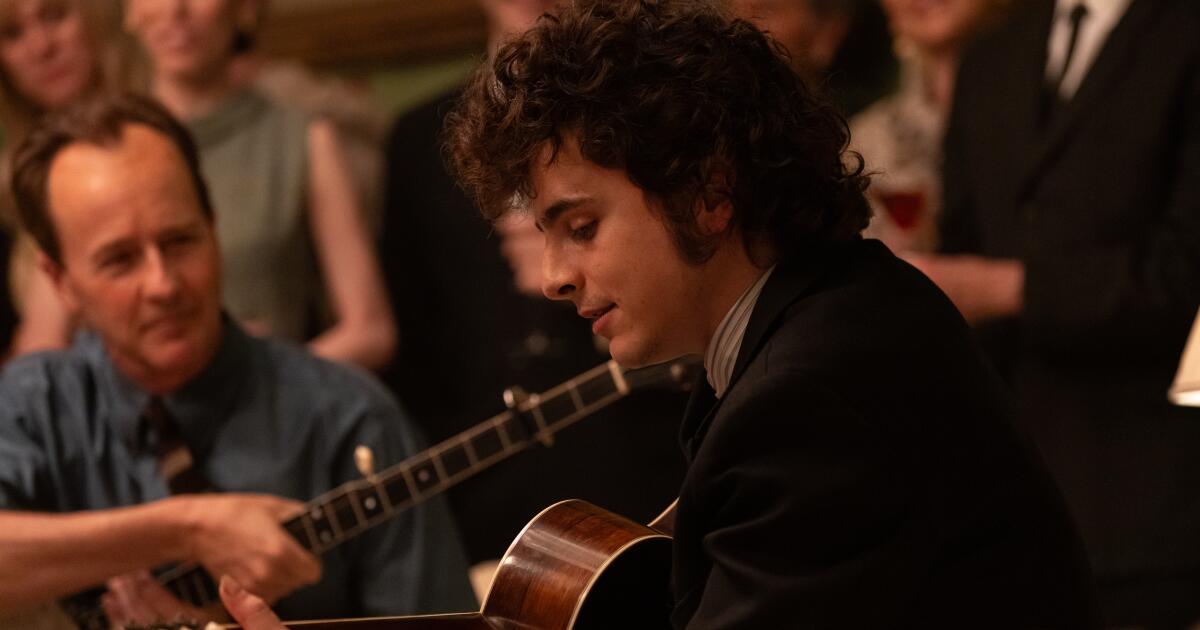‘A Complete Unknown’ review: Chalamet scores as Bob Dylan

Folk music is something that’s mainly overheard in the elegant first stretch of the often lovely “A Complete Unknown” — it’s something happening the next room over, down the hallway, in a different club farther along the way, past the crazy tambourine man. You lean in to hear it, as do the characters, who come together as if responding to a call. Are they forming a community? That would be putting it too sentimentally. This is a scene.
Banjo chords float down the corridor of a ghostly, near-deserted New Jersey psychiatric hospital, where an ailing Woody Guthrie (Scoot McNairy) sees visitors. Joan Baez (Monica Barbaro), striding her way through Greenwich Village, hears something new and slows down, dropping into a basement for a peek. And some children notice it, too, one morning in their woodsy cabin’s breakfast nook, when a stranger whom their dad brought home — some kid named Bobby — roughs his way through the changes of a new song as sunlight softens the air. The room is spellbound.
Bobby is, of course, Bob Dylan, played here by Timothée Chalamet in a near-magical performance that throws off all the right kind of sparks: newness, genius, a touch of aloofness that was probably easier for Dylan to fake than modesty and, under it all, a kind of aggressive, combative hunger. Chalamet has already taken his boy messiah in the “Dune” movies to a dangerously dark place; his Dylan is cut from the same cloth, uncomfortable with the mantle thrust upon him. Director James Mangold favors the actor with long takes, during which you forget Chalamet is there, only a master poker player waiting for the right hand to go all in.
Superfans aren’t necessarily going to love this. It’s a movie made with affection, but also with the wisdom that visionaries can sometimes be jerks. Then again, their hero won’t get a fairer shake than in “A Complete Unknown,” which presents the tunes vividly (classic after classic, all of them sung live by the cast) while keeping things neatly chronological among the four or so years that any biopic interested in Dylan’s artistic arrival would have to cover, from his penniless 1961 arrival in New York through his 1965 rebellion at the Newport Folk Festival. Todd Haynes did all of that and more in his dazzling, experimental “I’m Not There,” a 2007 film that even gives a bewigged Cate Blanchett a chance to embody the singer, but you can call Mangold’s straightforward approach a valid entry-level course.
In shaping the material (based on Elijah Wald’s 2015 book “Dylan Goes Electric!”) for a script, Mangold and Jay Cocks — a collaborator with Martin Scorsese on some of his more lingering adaptations (“The Age of Innocence,” “Silence”) — have landed on a counterintuitive but brilliant organizing principle, one that no great-man biopic has, to my mind, ever tried. In order for this dream to happen, that is, in order for Dylan to become Dylan, a lot of other people’s dreams had to die. We already know about the Minnesotan’s penchant for self-revision and self-destruction and the film includes a bar mitzvah photo in a secret scrapbook.
But there’s a surprising amount of collateral damage here, too. You see it in the movie’s collision of genres — folk, blues, rock — and its fine sense of popular art in flux. Edward Norton supplies the film with a gentle Pete Seeger, someone used to leading audiences in peaceful, utopian song but increasingly mystified by this newcomer who sharpens the folk movement into a spear and then takes the battle in a completely different direction.

Elle Fanning and Timothée Chalamet in the movie “A Complete Unknown.”
(Searchlight Pictures)
Dylan’s women suffer mightily; they’re the heart of the film. We watch Barbaro’s Baez grapple with his distance. Their tryst starts off explosively: After their first night together, they rise to learn the Cuban missile crisis has thankfully ended. (“Well, that’s that,” a bed-headed Chalamet mumbles.) Then they sing “Blowin’ in the Wind” in the sheets. It’s not long before Baez grows tired of his remove, though. Their sold-out tour as a duo becomes a nightmare of onstage sniping.
Elle Fanning, already one of the most exquisite sufferers in American movies, steals the film with her version of Suze Rotolo, here renamed Sylvie, Dylan’s girlfriend from the time. An attractive, confident Manhattanite with a full schedule of activism, classes and volunteering, she radicalizes Bob, taking him to civil rights speeches. But watch how the movie captures him turning away, appreciating the growing crowds. Already she’s losing him and Fanning’s character, with her devastated eyes, can’t do a thing about it. Watching Dylan and Baez sing “It Ain’t Me, Babe,” she flees in a panic, Fanning uncorking the closeup of the year.
“You gave her the song,” Sylvie quietly accuses him a little earlier, crushed, a line that cuts to something deeper. He gave us all the songs. And then he became ours, even as we still wonder, 60 years later, what it is we actually got.
‘A Complete Unknown’
Rated: R, for language
Running time: 2 hours, 21 minutes
Playing: In wide release Wednesday, Dec. 25




